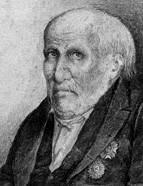

José da Silva Lisboa was born in Salvador on 16 July 1756. His father, Henrique da Silva Lisboa, a native of Lisbon, was an “architect,” and his mother, Helena Nunes de Jesus, a Bahian woman, was reportedly of mixed race ( parda ). The profession of architect at the time was considered mechanical and akin to other modest occupations, a “flaw” of his father’s that would often be recalled during José’s life, along with his mother’s mixed heritage (Kirschner, 2009, p. 18).
In 1784, he married Ana Francisca Benedita, the daughter of Antônio Álvares de Figueiredo, a graduate from Pernambuco. According to a biography published by one of his sons, Bento da Silva Lisboa, in 1839, José da Silva Lisboa began studying Latin at the age of eight and later studied “Rational and Moral Philosophy” at the Carmelite friars’ convent, where he also learned music and piano (Lisboa, Bento 1839, p. 186).
In 1773, he made his first trip to Portugal to study rhetoric and prepare for the entrance exams at Coimbra, with assistance from Pedro José da Fonseca’s classes in Lisbon. He enrolled at the University of Coimbra in the legal and philosophical courses, dedicating himself to the study of Greek and Hebrew, and in 1778, he became a substitute professor for these subjects. Having been a student of Domingos Vandelli at Coimbra, Lisboa maintained correspondence and collaboration with the renowned naturalist on scientific matters (Kirschner, 2009, p. 45). In 1779, he earned degrees in Canon and Philosophical Law, and shortly thereafter, in 1780, he returned to Salvador, where he was appointed ouvidor (magistrate) of the district of Ilhéus, a position he held for a brief and tumultuous period. In 1782, he was appointed Royal Professor of Rational and Moral Philosophy and substitute professor of the Greek language, a role he held until 1787.
This work is financed by national funds through FCT - Foundation for Science and Technology, I.P, in the scope of the projects UIDB/04311/2020 and UIDP/04311/2020.
